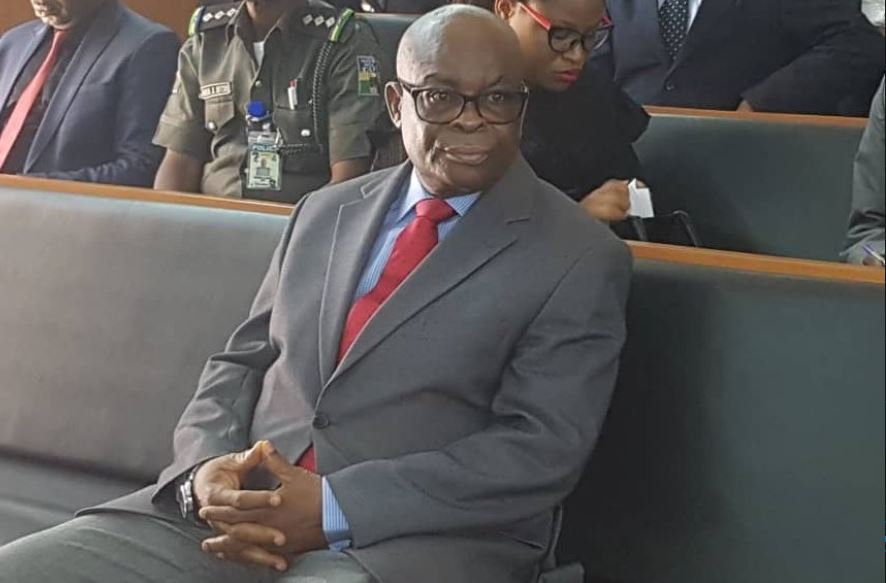In a split decision of six to one, the Supreme Court yesterday dismissed the suit filed by the Cross River State government against the suspension and trial of former Chief Justice of Nigeria (CJN), Justice Walter Onnoghen, by the Code of Conduct Tribunal (CCT).
The apex court described the suit as incompetent.
In her dissenting judgement, Justice Mary Peter-Odili granted all the reliefs sought by the plaintiff after holding that it has the locus standi to institute the action.
Justice Odili who dismissed the preliminary objection filed by the federal government held that it was proper for the plaintiff to bring the action having been clothed with locus standi.
She also held that the CCT lacked the jurisdiction to adjudicate on the criminal charge filed against Onnoghen.
Justice Odili argued that as a judicial officer, the matter ought to have been handled by the National Judicial Council (NJC) first as in Nganjiwa Vs Federal Republic of Nigeria (2017).
The Cross River State government had in a suit marked SC/145/2019 filed by its attorney-general challenged the suspension and trial of Justice Onnoghen by the CCT.
In the majority judgment, six of the seven justices of the apex court panel held that the plaintiff lacked the requisite locus standi to institute the suit.
At the last adjourned date when the case came up, counsel for the plaintiff, Locius Nwosu (SAN) had while adopting his brief of argument urged the court to grant the reliefs sought by the state government.
On his part, the counsel to the defendants and solicitor-general of the federation, Dayo Akpata, argued his notice of preliminary objection in urging the court to dismiss the suit on the ground that the plaintiff lacked the locus standi to institute it.
In a notice of preliminary objections filed by attorney-general of the federation and minister of Justice, Abubakar Malami (SAN), the federal government challenged the jurisdiction of the court to entertain the matter on the grounds that “there is no dispute between the defendants in this suit and the plaintiff as envisaged under Section 232(1) of the 1999 Constitution (as amended)
The government also contended that “the subject matter of this suit is personal to Hon. Justice Onnoghen Nkanu Walter Samuel and does not in any way affects the Cross River State government as to confer it with the locus to institute this suit.
“The reliefs and claims made herein by the plaintiff are not for the benefit of Cross River State but personal to Hon Justice Onnoghen Nkanu Walter Samuel,” he said.
Besides, Akpata informed the apex court that the subject matter of the suit was already before the Court of Appeal. The appellate court in his ruling faulted the CCT’s suspension of Onnoghen but failed to make a declaration.
But Akpata submitted that the action of the Cross River State government amounted to “forum shopping and an abuse of court process.”
Nwosu (Onnoghen’s counsel) however insisted that his client’s case was different from the appeal filed by the ex-CJN at the Court of Appeal.
“My lords, the suit is not about Justice Onnoghen but about the interpretation of the constitution. It is for the interpretation of the provisions of the 1999 Constitution, particularly Sections 4,5,6, 153(1), 158(1), Paragraph 21(b) of Part 1 of the Third Schedule of the 1999 Constitution (as amended), the purported filling of the charge in charge No.
CCT/ABJ/01/19 between FGN vs Hon. Justice Onnoghen Nkanu Walter Samuel before the CCT against a judicial officer who in this case is the chief justice of Nigeria, without any formal complaint having been made against him to the NJC robbed the tribunal of jurisdiction to try the charge, and all the proceedings relating thereto are null and void, a nullity,” he had argued.
In the originating summons, the plaintiff posed four questions for the determination of the Supreme Court as follows: “Whether upon the proper interpretation of the provisions of Sections 4,5 and 6 of the 1999 Constitution (as amended), the constitution clearly recognises and guarantees the doctrine of separation of powers and checks and balances relating to the legislature, executive and judicial arms of government.”
After taking all the parties’ briefs, the Supreme Court dismissed the suit for lack of jurisdiction on the part of the state government.
